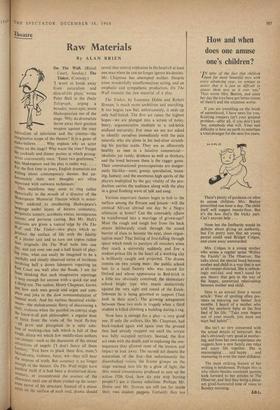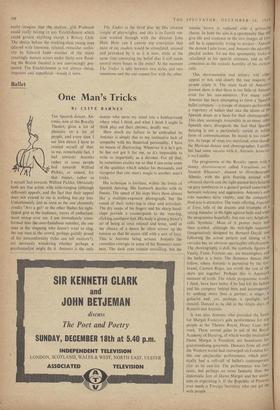Theatre
Raw Materials
By ALAN BRIEN WANT to break away from naturalism and
slice-of-life plays,' writes Peter Hall in the Daily Telegraph, urging a
broader, more epic, more Shakespearian use of the stage. 'Why do dramatists throw away their greatest weapon against the cosy naturalism of television and the cinema—the huaginative scope of the theatre? It is a game of
Make-believe. . . . Why explain why an actor Comes on the stage? Why waste the time? Forget
the cocktails and dinner parties at which protag-
"ists conveniently meet. "Enter two gentlemen," la, Ys Shakespeare and the play is under way. . . .
l'or the first time in years, English dramatists are Writing about contemporary themes. But un- fortunately their new thoughts are often expressed with outworn techniques.'
This manifesto may seem to ring rather thetorically in the mouth of a director of the Shakespeare Memorial Theatre which is notor- ;14131Y addicted to smothering Shakespeare's language under layers of bizarre costumery,
Peripatetic scenery, acrobatic extras, incongruous
accents and perverse casting. But Mr. Hall's criticisms are given a topical 'edge by On 7'he Wall and The Tinker—two plays which re- Produce the surface of life with the fidelity of a plaster cast and so turn out copies rather than originals. On The "Wall boils into one ,tlaY, and just over one and a half hours of play- ing time, what can easily be imagined to be a e.atefully and closely observed series of incidents Involving half a dozen labourers repairing an ast Coast sea wall after the floods. I am far 1:Mit1 thinking that such imaginative reportage 18 "SY enough for anyone with a quick ear and 1,1 sharp eye. The author, Henry Chapman, knows Just how such men gossip and argue and com- Plain and joke in the slow somnambulation of
Manual work. And his various theatrical excite-
Ments—the melodramatic flurry of discovering a theft, violence when the puzzled ex-convict slugs
the know-it-all pub philosopher, a regular dose
°I farce from the visits of the local fly-boy -Tail grow and precipitate in a salty solo-
!' of working-class talk which is full of that 1" "11h, direct wit which few middle-class authors
4ttrac Can imitate—such as the discussion of the sexual lions of angels. CI don't fancy all them f ,,eathers.' You have to pluck them first, mate.) t7elodrama, violence, farce, wit—they still bear ne impress of truth. But accuracy is no longer e.n°ugh in the theatre. On The Wall might have Justified itself if it had been a dramatised docu- 11,entarY, or concentrated the essence of the enaracters until one of thom yielded up the inner- Most secret of his structure. Instead of a minor crisis on the surface of each soul, drama should reveal that central explosion in the heart of at least one man when he can no longer ignore his destiny. Mr. Chapman has attempted neither. Despite some wonderfully unselfconscious acting, and an emphatic and sympathetic production, On The Wall remains the raw material of a play.
The Tinker, by Laurence Dobie and Robert Sloman, is much more ambitious and searching. It too begins raw but, unfortunately, it ends up only half-baked. The first act raises the highest hopes—we are plunged into a scrum of noisy, beery, argumentative students at a red-brick midland university. For once we are not asked to identify ourselves immediately with the pale neurotic who sits alone in his bed-sitter scratch- ing his psychic scabs. They are as offensively healthy as men in a laxative commercial— idealistic yet randy, drinkers as well as thinkers, and the bond between them is the rugger game. Their conversational preoccupations are danger- ously life-like--smut, gossip, speculation, boast- ing, fantasy; and the enormous high spirits of the players multiplied by the gay vitality of the pro- duction carries the audience along with the play in a great frothing wave of talk and song.
Various important themes begin to bob to the surface among the flotsam and jetsam—will the comical African abroad one day be a Negro aristocrat at home? Can the comradely aflaire be transformed into a marriage of grown-ups? Must the rough and tough boy from the back streets deliberately crash through the sound barrier of class to become the neat, clean organ- isation man? That feeling of free-falling through space which tends to paralyse all outsiders when they reach a university suddenly and live a student-prince life in the heart of a working city is brilliantly caught and projected. The drama centres on two young men: the public school heir to a local factory who was reared for Oxford and whose appearance in Red-brick is a little too obviously contrived; the elementary school bright type who reacts instinctively against the very sight and sound of the Estab- lishment he is being groomed to support (lust look in their eyes'). The growing antagonism between these two ends in tragedy when a third student is killed climbing a building during a rag.
Now here is enough for a play---a very good one. If only the authors, like Mr. Chapman, had back-tracked again and again over the ground they had already mapped out until the terrain was fully occupied territory. Instead, the first act ends with the death, and in exploring the con- sequences they allowed most of the tension and impact to leak away. The second act deserts the naturalism of the first—but unfortunately the disembodied voices, the frozen groups on the stage warmed into life by a glow of light, the thin moral conundrums produced to sum up the action ('Oh God, how do you stop hurting people?') are a clumsy substitute. Perhaps Mr. Dobie and Mr. Sloman are still too far inside their nwn student puppets. Certainly they too easily imagine that the shallow, glib Professor could really belong to any Establishment which could govern anything except a Rotary Club. The choice before the working-class young man (played with immense, relaxed, muscular autho- rity by Edward Judd—another of the many amazingly mature actors under thirty now flood- ing the British theatre) is not convincingly pre- sented. The Establishment is not always cheap, impotent and superficial- would it were. The Tinker is the third play by this talented couple of playwrights, and this is its fourth ver- sion worked through with the director John Hale. How can I convey my conviction that most of my readers would be stimulated, amused and provoked by it as it is now, while at the same time conveying my belief that it still needs several more hours in the oven? At the moment The Tinker is split between two styles and two intentions and the one cannot live with the other.



































 Previous page
Previous page